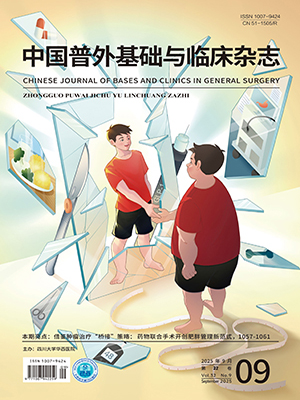Objective To evaluate the effectiveness of fluid therapy on an early goal-directed approach to resuscitation basis and the standard fluid therapy of adequate resuscitation on the prognosis of severe acute pancreatitis (SAP)in early stage.
Methods The clinical data of SAP patients admitted to surgical intensive care unit within 72 h after onset of symptoms from January 2000 to November 2011 were analyzed retrospectively. A total of 97 patients with a confirmed diagnosis of SAP were divided into two groups based on whether adopting the early goal-directed fluid resuscitation strategies or not. Patients admitted from January 2000 to December 2004 did not adopt the early goal-directed fluid resuscitation strategies,therefore,being allocated into standard fluid therapy group (n=34); patients admitted from January 2005 to November 2011 adopted the early goal-directed fluid resuscitation strategies and who were allocated into early goal-directed fluid therapy group (n=63). With the exception of the fluid therapy strategies,the two group patients received standard treatment for SAP. The acute physiology and chronic health evaluation Ⅱ score (APACHEⅡ) and multiple organ dysfunction score (Marshall), rate of multiple organ dysfunction syndrome (MODS) within the first week after admission,pancreatic infection rate,and in-hospital mortality were compared between the two groups.
Results Compared with the standard fluid therapy group on day 3 after admission,APACHEⅡ score and Marshall score decreased significantly in the early goal-directed fluid therapy group (APACHEⅡ score:7.38±4.01 versus 11.35±4.27, P=0.011;Marshall score:4.13±2.06 versus 6.82±3.15, P=0.016). In addition,patients in the early goal-directed fluid therapy group experienced a trend toward lower rates of MODS with the first week after admission,pancreatic infection,and in-hospital mortality (rate of MODS:46.0% versus 61.8%,P=0.139;rate of pancreatic infection:31.7% versus 44.1%, P=0.226;in-hospital mortality:15.8% versus 23.5%,P=0.355) that did not reach statistical significance.
Conclusion Although early goal-directed fluid therapy for SAP in acute response stage may have ameliorated the patient’s condition and improved outcome to a certain degree,carefully designed human clinical trials should be performed in a randomized controlled manner to assess the role of such fluid resuscitation in SAP.
Citation: CHEN Hong,SUN Jiabang,ZHU Yan,JIA Jianguo,LI Fei,LIU Dachuan,.. Evaluation of Fluid Resuscitation Strategy for Severe Acute Pancreatitis in Early Stage. CHINESE JOURNAL OF BASES AND CLINICS IN GENERAL SURGERY, 2012, 19(5): 507-511. doi: Copy
Copyright © the editorial department of CHINESE JOURNAL OF BASES AND CLINICS IN GENERAL SURGERY of West China Medical Publisher. All rights reserved




